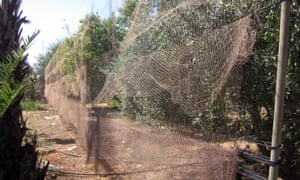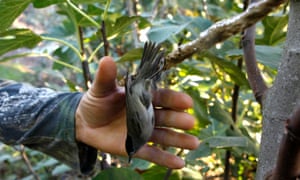PressReader.com - Connecting People Through News
The UK government has just announced a programme to stop this at its military bases:
UK steps up efforts to stop bird trapping in Cyprus - GOV.UK
The Guardian reports:
MoD campaign to stop killing of songbirds on Cyprus hailed a success
Poachers killed 800,000 birds on UK base in 2016 but 72% drop was recorded in last year
When Britain’s armed forces minister, Mark Lancaster, assumed office he was surprised by the amount of letters in his mailbag regarding an issue the military would not ordinarily address. One after the other spoke of the killing of migratory songbirds on Cyprus. Hundreds of thousands of robins, blackcaps, thrushes and other much-loved garden species were being illegally slaughtered by trappers on Ministry of Defence land. Was there nothing he could do?
Lancaster, who served in Cyprus during a gap year commission in the army in 1987, resolved to right the wrong. He made good on the promise last weekend.
Under a baking sun, on the easternmost edge of the British sovereign base area of Dhekelia, Lancaster witnessed the weapons being deployed in the battle to curb a practice blamed for the death of more than 800,000 birds on the military facility in 2016 alone.
“Today we are here to mark a success story,” he told the Guardian. “I was getting a huge number of letters expressing concern and it is very nice to be able to report back that there has been such a reduction.”
There was a 72% drop in the illegal killing of birds in the area over the last year, which Lancaster, who continues to serve in the army reserves as a colonel, said “demonstrates the wider utility of defence above and beyond military action”.
Cyprus’s resident infantry, currently the 2nd Battalion Royal Anglian Regiment, supporting the police-led crackdown, more usually prides itself on its high readiness to respond to threats in the Middle East. And the base’s police force ordinarily focuses on counter-terrorism and maritime crime.
Poaching was once a cottage industry, the result of a traditional fondness for the island delicacy ambelopoulia. But it has expanded into industrial-scale organised crime, and the black market culinary industry is now worth millions of pounds. Birds are subjected to agonising deaths on glue-coated sticks or in fine mist nets that trappers deploy.
“I’m told that 12 birds are potentially sold for €60 (£53), ” said Lancaster, standing under a tent pitched on scrubland in the firing range at Cape Pyla, where the confiscated paraphernalia of trappers had been laid out for him, along with equipment used by police. “Its very encouraging that we have had success but we are not going to be complacent. We will continue.”
Migratory birds en route from Africa to Europe instinctively head towards Cape Pyla as they navigate around the bright lights of Larnaka and the resort of Ayia Napa.No other place in Cyprus is targeted as much by poachers as the British base area. The historic lack of development has not only turned the territory into an area of outstanding natural beauty but one of special conservation, home to unique habitats and species.
From August to October, base authorities have their work cut out for them. The war has become increasingly high-tech. In the last year, thermal-imaging drones, night-vision goggles and hidden cameras have been deployed by police on the base, who are also equipped with stun guns.
In their headgear and bulletproof vests, officers working with forces personnel conduct “Operation Freedom” with the precision of a military campaign.
The equivalent of 45 football pitches of purposely planted fast-growing acacia trees, used to conceal nets and capture birds, have been destroyed. Just under 45 miles (70km) of illegal water pipes, employed to irrigate the non-native trees, were removed last year.
Fines have also been augmented, and legislation bolstering prosecution will be passed by August, when the next migratory season begins. But while a great deal of equipment used by trappers has also been seized, including electronic calling devices used to lure the birds, the poachers remain determined.
“This is not Surrey-on-sea” said the military base’s police chief constable, Chris Eyre. “These people are not afraid to use firearms. Our field officers face huge risk.”
Ambushes are common, with officers reporting fights, and worse, when they encounter trappers. Several have been injured.
“We’ve had shotguns fired at our feet, rottweilers let loose on us, vehicles that have tried to run us over, all because we have taken a more robust approach,” said Sgt Andy Adamou, who was honoured during Lancaster’s visit for the courage he had shown during one especially tense showdown. “They see us as a threat to their livelihoods. And as long as there is demand, there will be the need for supply.”
In theory, the Cypriot government prohibits the illegal trade. But the delicacy is readily available, albeit behind the counter and usually camouflaged by lettuce leaves, in villages across the island.
Some island officials have openly bragged that the industry helped pay their children’s education fees in Britain and beyond.
“To beat the target we have already achieved is going to be tough,” said Michalis Zacharia, the police officer in charge of the bird crime team. “We are going to have to come face to face with criminal elements and you never know how they will react. Our only form of protection are the Tasers, but we are determined and we are going to do it.”
.
.
.




No comments:
Post a Comment